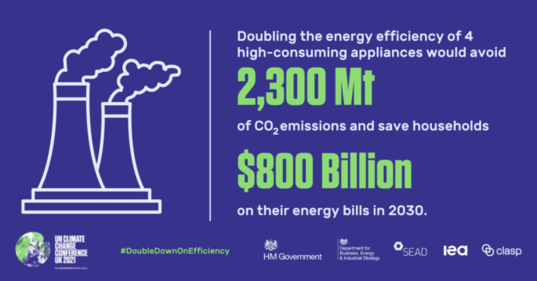On 30 September, Climate Group and the UK Government presented the EP100 initiative and freshly launched 2021 Product Efficiency Call to Action. Both initiatives are seeking business support to help ensure that product efficiency gets due attention at the negotiating table in Glasgow.
Participants heard from Mahindra & Mahindra and Trane Technologies – both members of Climate Group’s EP100 initiative – on their product efficiency journeys and insights on the power of setting specific corporate energy efficiency goals.
“We cannot win the race to net-zero emissions without improving the energy efficiency of products like air conditioners, refrigerators, lighting, and electric motors”
“We cannot win the race to net-zero emissions without improving the energy efficiency of products like air conditioners, refrigerators, lighting, and electric motors”
The case for product efficiency
Just four products account for 40% of current global electricity consumption and that consumption is set to increase significantly, particularly in developing countries:
This rapid rise in global energy demand risks outpacing our other efforts to decarbonise the global energy system.
At the same time, doubling the efficiency of these four products can cut electricity demand by 30,000 TWh between 2022 and 2030, the equivalent generation of 1,500 coal-fired power plants, and can avoid 13 Gt of CO2 emissions. Moreover, the products needed to achieve this doubling are largely available on the market today.
Action on energy and product efficiency therefore represents both a challenge and an opportunity in the climate decade.
Leading corporates taking action on energy efficiency
Since 2015 global annual energy efficiency improvement rates have sat well below the levels needed to achieve the Paris Agreement’s decarbonisation goals. However, this fact belies existing energy efficiency leadership from the business community. During the webinar, we heard from Mahindra & Mahindra Ltd. and Trane Technologies who are leading in the smart energy space and bucking the trend.
Mahindra and Mahindra, an Indian multinational automotive manufacturing corporation, emphasised how being part of EP100 provides an economic and environmental win for business, whilst encouraging others to engage in the initiative. Committed to doubling their energy productivity by 2030, relative to a 2009 baseline, the company revealed the sheer depth and breadth of product efficiency retrofits that they have undertaken since 2016 (1,892 projects in total). These projects – simple, actionable and with short returns on investment – such as LED lighting, HVAC and motor system replacements now saves them 27,317 GJ and INR 91 million each year relative to their baseline. These projects are elevating production efficiency which, in turn, is translating into increased competitiveness, energy resiliency and carbon emission reductions.
Trane Technologies joined EP100 in 2019 and is a leading manufacturer of heating, ventilating and air conditioning systems, as well as building management systems and controls. Headquartered in Ireland, they are committed to doubling their energy productivity by 2035 relative to a 2013 baseline. In the session, Trane Technologies highlighted two key factors which drove their decision to join EP100:
- Firstly, credibility is essential. With energy efficiency being well-understood as the “first fuel” in any credible climate strategy, Trane Technologies recognises the need to set a specific efficiency-related target. By joining EP100, Trane Technologies felt this ensured a science-based and, in turn, credible climate strategy was in place.
- Secondly, EP100, through annual reporting, measures corporate energy efficiency via the energy productivity metric. This is attractive, Trane Technologies says, because it provides a clear way for businesses to communicate how effectively they are decoupling their revenue from energy use (and carbon emissions).
Trane Technologies also shared how they saw their EP100 commitment as a welcome value-add to an overarching net zero carbon commitment, such as that set through the Science Based Targets initiative. An existing SBTi commitment can act as a ‘North Star’, while EP100 membership provides an efficiency-focused implementation pathway for achieving it.
How to take action on product efficiency
The UK Government has partnered with the International Energy Agency (IEA) and other partners to raise global ambition on product efficiency through the ‘Super Efficient Equipment and Appliances Deployment Initiative’ (SEAD) via the freshly launched 2021 Product Efficiency Call to Action.
More information
By supporting the Product Efficiency Call to Action, national governments are committing to work together to double the efficiency of air conditioners, refrigerators, motors and lighting by 2030.
Simultaneously, EP100 is working in partnership with the UK Government to leverage the same ambition from the business community to send a strong message about the need for action on product efficiency to the negotiating table at Glasgow.
We therefore invite you to join EP100 and endorse the Call to Action on the road to COP26. As a valued EP100 member you will benefit from continued profiling, networking and policy advocacy opportunities.
